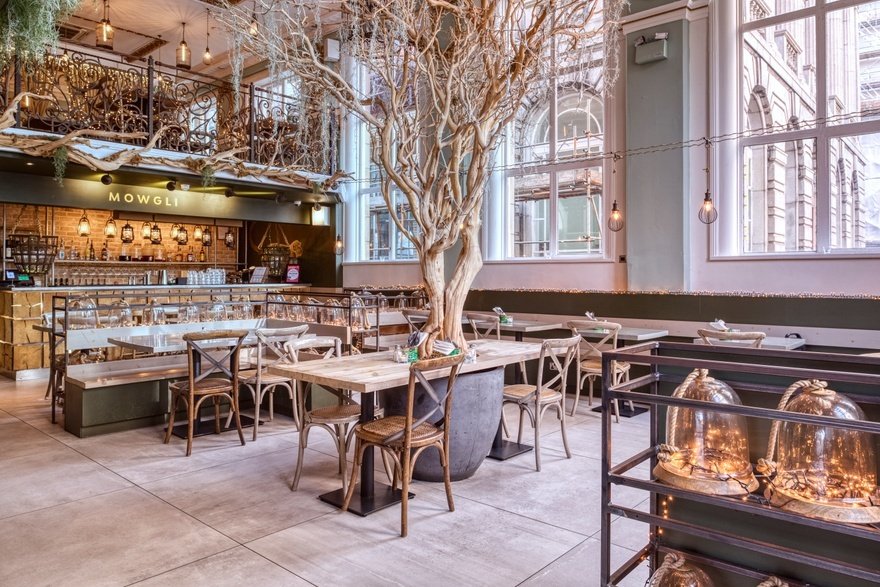Is pedestrianisation the road to success?
Plans to pedestrianise city centres to free up space for consumers post-lockdown sound like a breath of fresh air for restaurant operators, but will car-free zones breathe new life into UK high streets? Jennie Milsom hears from those affected
Earlier this month, the mayor of London, Sadiq Khan, announced plans to repurpose central London streets into "one of the largest car-free zones in any capital city in the world", in a move designed to enable safe social distancing, improve air quality and keep London "globally competitive".
Similarly, towns and cities across the UK are looking to pedestrianise streets to encourage people to return safely. Councils in Oxford, Doncaster Shropshire and Manchester are all looking to limit traffic in town and city centres to allow physical distancing and aid the economic recovery, while mayor of Liverpool Joe Anderson has announced a £450,000 project to redesign Liverpool's outdoor spaces, to create more European-style covered seating areas.
With pedestrianisation plans under consideration up and down the country, coupled with the #UKGrandOutDoorCafe campaign, which is calling on the government to grant operators "blanket permission" to use pedestrianised streets for outdoor dining, the question is: are UK restaurants poised to fling open their doors "à la med" with a new al fresco approach to eating out?
It's not just a case of widening pavements and putting out some tables, says Craig Bunting, co-founder of Midlands-based coffee and all-day dining group Bear. He would support pedestrianisation, but only if it is carried out "with the bigger picture in mind".
"This should be based on the behaviour of the communities that use the high streets and the businesses that operate within them," he said.
Bunting said that other considerations included whether zoning would be timed and whether pedestrianisation would work "in tandem" with supporting businesses in creating outdoor café-style seating spaces that were "active, vibrant and welcoming".
"The streets need to look alive and there is work to be done on street levels, seating zones, bike racks, planting and green space. It needs to look great, otherwise, take the cars away and they will look even more empty. People are not drawn to a pedestrianised street – they are attracted to the impact that, if executed correctly, the result should achieve."
People are not drawn to a pedestrianised street – they are attracted to the impact that, if executed correctly, the result should achieve.
Des Gunewardena, chief executive of D&D London, said that the worst outcome would be to "suck the life out of city centres" by pedestrianising vast areas without thinking it through and making access difficult.
Although he did see potential, if done correctly. "You've got to think about how you can improve people's quality of life," he said. "What happens in the summer is that – especially with the Brits – everybody wants to be outside. So if you increase the area in which people can trade, you'll do more revenue."
Nisha Katona, founder of Bengali street food restaurants Mowgli, said: "It is into the chasm between safety and survival that the outside seating question is launched and freighted with such hope."
Her 13 restaurants on busy high streets across the UK collectively have just 25 outside covers and she does not see pre-existing outside seating as a solution. She added: "To make any difference to us, we would need a deregulation of outside spaces with a zealous encouragement at government level for an al fresco dining free-for-all. My model for Mowgli's re-emergence dare not be founded on such an ambitious change: better would be a considered change to the seemingly token two-metre rule."
Chef-restaurateur Stevie Parle owns Pastaio in Soho's Ganton Street, which is pedestrianised after 11am so lunchtime and evening diners enjoyed a "nice vibe on the street" flanked by neighbouring operators. Although in favour of pedestrianisation, he said it was important that businesses remain accessible for everyone. "That's one of the big issues – how people are going to get to it."
For operators with an existing allocation of outside space, extending outwards would make a positive difference when reopening, he said, and confirmed he had already approached Westminster Council to ask for more space, which would allow for another row of tables and help comply with physical distancing.
Krish Singh, property director at Honest Burgers, said the benefits of being granted permission to trade al fresco would boil down to two issues: speed and fees, adding that a lengthy application process would detract from the benefit: "It's something that would need to happen soon, otherwise it would defeat the object. In the UK outside space can only be used for certain months."
Singh believed that if councils were to encourage outdoor dining, "temporary structures to allow shelter" from showers and chilly evenings must also be considered, saying such structures were commonplace in Europe, otherwise the benefits would be limited to "only a few very select days". Overall he was in favour of encouraging people to congregate in outside areas populated with restaurants and pubs. "This would definitely help over the summer months and should be encouraged, but it won't be the cure for the pain that's to come with likely reduced trade, especially over the summer."
Transport-planner view
David Frisby, director at Mode Transport Planning, believes that temporary plans for "stopping up the highway" – where highways are reallocated to pedestrians and cyclists – present an opportunity for those in the hospitality industry. He referred to a report by LivingStreets.org, which concluded that pedestrianisation can increase footfall by up to 30% and boost commercial trade by up to 40%.
"If a pedestrianised area is friendly, welcoming and inviting, people will want to spend more time and money there – chances are they will spend money to sit and eat and drink and enjoy more time there relaxing.
"Pedestrianisation presents an opportunity for the hospitality industry to lobby councils to ensure their business not only continues but thrives, by assisting with social distancing measures and providing a better environment in the summer. It will also provide enough time to plan for the winter – with heaters and shelters – because people aren't going to want or be allowed to be packed into bars, but we'll want to go out and have a drink and socialise.
"City centre retailers often believe that half of their customers come by car or bus and for that reason can be against pedestrianisation; however there is evidence that it is closer to 35% with the remaining 65% arriving either by foot or bicycle."
If a pedestrianised area is friendly, welcoming and inviting, people will want to spend more time and money there
Photo credit: Shutterstock
Continue reading
You need to be a premium member to view this. Subscribe from just 99p per week.
Already subscribed? Log In













